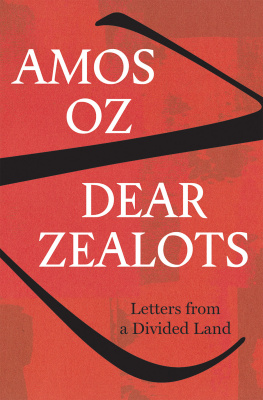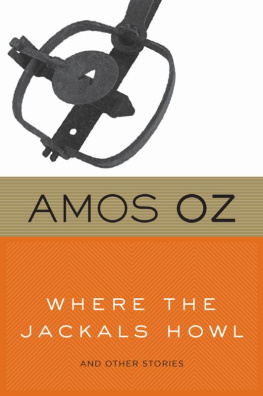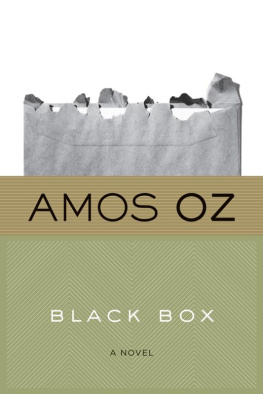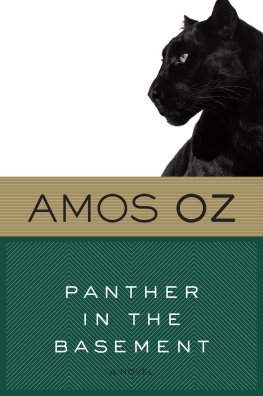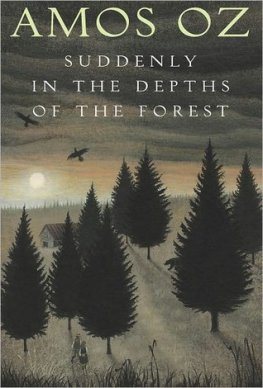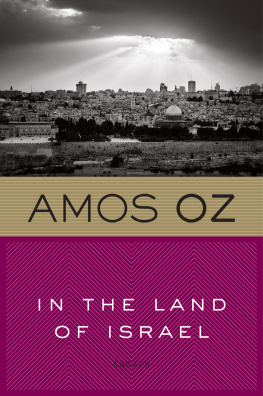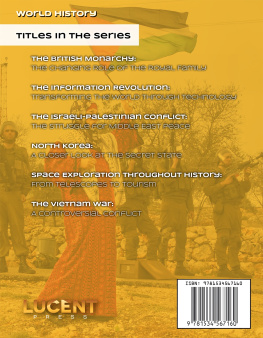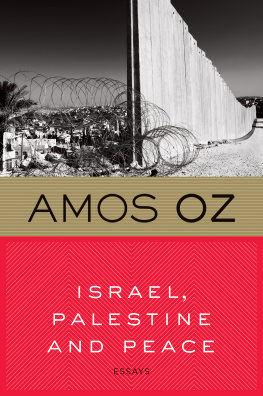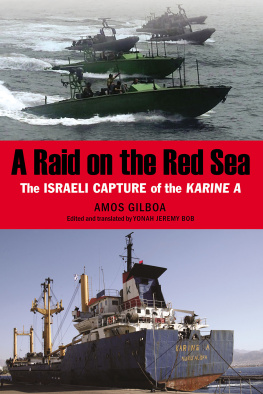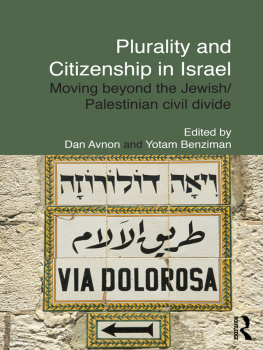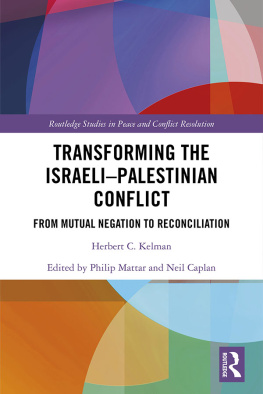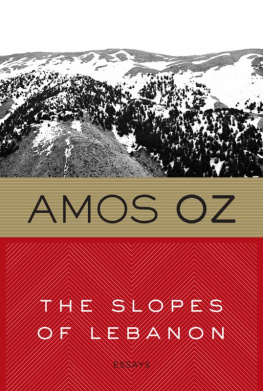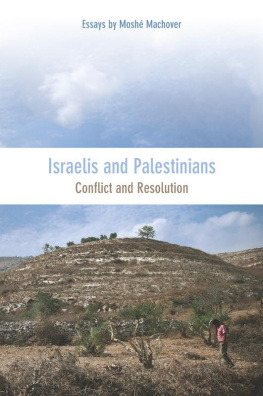Introduction
Some months ago, when Israel and the Palestinian Liberation Organisation recognised each other, I had a vivid recollection of the night of 14-15 May 1948, when Israel declared its independence. I was nine years old. I remember my father coming to my bed and lying beside me in the dark. When I was a boy, I was beaten in school in Russia and then in Poland for being a little Jew, he said. You may still get beaten in school, but not for being a Jew. This is what the State of Israel is all about. In the darkness I could suddenly feel his tears. It was the only time in my life that my father cried in my presence.
The next morning, within hours of Israels declaration of independence, five Arab armies invaded the country from all directions. The Jewish section of Jerusalem was besieged for several months, bombarded by Jordanian artillery from the east and by Egyptian forces from the south. What had been, since the beginning of the century, a neighbourly feud between Arabs and Jews turned that night into a major international war.
Twice in my life, in 1967 and again in 1973, I saw the face of war as a reservist soldier, first in Sinai and then in the Golan Heights. That experience turned me into a peace activist, but not into a pacifist ready to turn the other cheek to an enemy. If anyone tries to take my life or the life of my people, I will fight. I will fight if anyone tries to enslave us, but nothing short of the defence of life and freedom could make me take up arms. National interest, ancestral rights and an extra bedroom for the nation are not reasons to go out on the battlefield.
As a teenager addicted to politics, I would do my shift as a night watchman along the perimeter fence of Kibbutz Hulda, secretly listening to the news on a portable radio. Through the night, I would wander between the transmissions of Jordan, Syria and Egypt. Whenever they referred to Israel, they used the term the Zionist entity. The announcer would say, the so-called government of the so-called state, but would stop short of pronouncing the word Israel, as if it were a four-letter word. The Arab world, primarily the Palestinians, dealt with us as if we were nothing more than a passing infection.
I remember how those nights in Kibbutz Hulda, about three miles from the pre-1967 armistice lines, were punctuated by fires and explosions on the eastern horizon as we guarded against the fedayeen, which is what the Palestinian infiltrators were called. On the Israeli radio station, you could hear the rhetoric of a society of armed settlers: Our generation, and perhaps generations to come, are destined to plough the fields while carrying a gun. At that time I didnt think I would see an Israel-Arab peace in my lifetime. The term Palestinians was hardly used in those days. It was almost as unpronounceable for Israelis as Israel was for the Arabs. We used to talk about refugees, terrorists or simply the enemy. Since the Israeli occupation of the West Bank and Gaza Strip, most of us simply refer to them as locals. One winter night I shared my guard duty in Kibbutz Hulda with an elderly ideologue (without the illicit radio). With a strangely ironic expression on his face, he suddenly whispered to me, What do you expect from those Palestinians? From their point of view, aliens have landed in their country and gradually taken some of it away, claiming that in return they will shower the natives with loving-kindness, and Palestinians simply said no thanks, and took to arms in order to repel the Zionist invaders. Being the teenage product of a conventional Zionist upbringing, I was shocked by his use of the word Palestinians, as well as by the treacherous revelation that the enemy not only had a point of view, but a fairly convincing one at that.
His words eventually turned me into a relativist about the ethical dimension of the Israeli-Palestinian tragedy. There is nothing tragic about the conflict between Israel and Syria or Israel and Iran. They have been the aggressors, and we have defended ourselves as best we could. The case between Israelis and Palestinians is a tragedy precisely because it is a clash between one very powerful claim and another. Israelis are in the land of Israel because there is not and cannot be a national homeland for the Jews anywhere else. The Palestinians are in Palestine because their ancestors have been here for more than a thousand years. Where one powerful claim clashes with another, there can be either an endless cycle of bloodshed or a somewhat inconsistent compromise. Since 1967, the Israeli peace movement has advocated a compromise based on mutual recognition of the simple fact that one small country, about the size of the state of New Jersey, is the only homeland for two peoples. Wherever there is a clash between right and right, a value higher than right ought to prevail, and this value is life itself. I believe a similar premise underlies the changing attitudes towards peace among Palestinians.
I was one of the first of the few who tried to express the thought that the question concerning the areas with a dense Palestinian population was not a question about territories but about people. Or, more precisely, about the Palestinian people. This stance was problematical, both because Palestinian nationalism was not yet an established fact even for many Palestinians, and because no Arab government was willing to recognise the very existence of Israel, in whatever borders. The Arab summit in Khartoum in the autumn of 1967 resolved that there would be no peace with Israel, no recognition of Israel and no direct negotiations with Israel. In these conditions it was difficult to voice a solution based on reciprocal recognition between the Israeli and Palestinian nations. This stance of no compromise had come about as a result of the events of that summer. In June 1967 Nassers Egypt, together with Syria, Jordan, Iraq and other Arab states, and accompanied by a chorus of ecstatic war-cries from the PLO, attacked Israel from all its borders with the declared aim of driving the Jews into the sea. Within a week the Arab armies were defeated, and the Israelis were in control of the Old City of Jerusalem, the West Bank, the Golan Heights and the Sinai Desert. Almost at once an argument broke out within Israel which has carried on for the past twenty-five years, about what to do with these territories.
Towards the end of1977 President Sadat came to Jerusalem and offered Israel total peace in return for total withdrawal. Within a couple of years a peace agreement was signed between Israel and Egypt on the basis of the return of the entire Sinai Peninsula to Egypt in exchange for a comprehensive peace and effective de-militarisation of Sinai. For the first time the twin taboos were broken: the Arab taboo about recognising Israel and the Israeli taboo about dismantling settlements. Eleven years later, in the autumn of 1988, the PLO announced, in somewhat veiled terms, that it was willing to negotiate with Israel about a two-state solution, that is to say partition of the land between Israel and Palestine. It was not the Intifada but this change in the Palestinian position that really made possible the profound change in the thoughts and feeling of many Israelis. In September 1993 an agreement in principle was signed between Israel and the PLO in Oslo, and the position that my friends and I had maintained ever since June 1967 became the fundamental standpoint of all sides in the negotiations: territory in exchange for peace and security, and a recognition that the Land was the homeland of two nations.
For many years, fanatics on all sides have tried to turn this conflict into a holy war or a racial clash. Do-gooders outside the region tended to present it as a civil rights issue or simply as a sad misunderstanding. Fortunately, this conflict is essentially nothing but a dispute over property: whose house? Who is going to get how much out of it? Such conflicts can be resolved through compromise. I believe in a two-state solution that can be achieved only step by step: Israeli recognition of the Palestinian right of self-determination in part of the land, in return for Arab readiness to meet Israels legitimate security provisions. Now that the agreement is signed, the two parties are not about to fall in love with each other (especially in the light of such incidents as the tragic Hebron massacre). Yet the parties do not need to see eye to eye regarding who was David and who was Goliath in this conflict. (Obviously if one focuses on the West Bank and Gaza Strip, then the Israelis are a clumsy Goliath, whereas the stone-throwing Palestinians are brave little David. Yet by changing the zoom and putting the frame around the conflict between almost 5 million Israelis and more than 100 million Arabs, and perhaps several hundreds of millions of Muslims, the question of David and Goliath looks very different.) Luckily, Israelis and Palestinians and other Arabs can conclude their conflict even without agreeing about the narrative.
Next page

